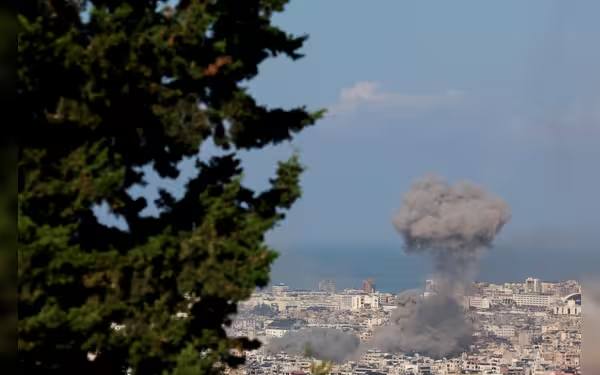Thursday, November 21, 2024 01:57 PM
Israel Issues Evacuation Orders Following Airstrike in Beirut
- Israeli airstrike kills Hezbollah official Mohammed Afif.
- Evacuation orders issued for southern Beirut areas.
- Tensions escalate amid ongoing Israel-Hezbollah conflict.
 Image Credits: arabnewspk
Image Credits: arabnewspkIsrael issues evacuation orders in Beirut after airstrike kills Hezbollah's Mohammed Afif, escalating regional tensions.
In recent developments in Beirut, the ongoing conflict between Israel and Hezbollah has escalated significantly. The Israeli military has issued new evacuation orders for three areas in southern Beirut, a move that has raised concerns among residents and international observers alike. This comes in the wake of a deadly airstrike that targeted a prominent Hezbollah official, Mohammed Afif, in central Beirut.
A Lebanese security source reported that the Israeli strike on Ras Al-Nabaa resulted in the death of Afif, who was known for his role in managing Hezbollah's media relations. The strike also caused injuries to three other individuals, according to Lebanon's health ministry. The situation remains fluid, with rescue operations ongoing to clear the rubble and search for any potential survivors trapped beneath the debris.
Hezbollah has been a significant player in the region, and Afif's death marks a notable moment in the ongoing conflict. He had been a key figure in communicating Hezbollah's messages to both local and international media, often operating under the veil of anonymity. His recent activities included press conferences where he announced military actions against Israel, including a drone strike targeting the residence of Israeli Prime Minister Benjamin Netanyahu.
The Israeli army has refrained from commenting on the specific strike that killed Afif, but the broader implications of such military actions are clear. The National News Agency of Lebanon described the destruction caused by the airstrike as "great," highlighting the precarious situation for civilians in the area. Reports indicate that some residents received evacuation warnings, but these were not taken seriously, leading to tragic consequences.
As tensions continue to rise, the international community watches closely. The assassination of prominent figures within Hezbollah, such as Afif, could lead to further retaliatory actions and an escalation of violence in the region. The situation remains critical, and the potential for increased conflict looms large.
The recent airstrike in Beirut underscores the fragile state of peace in the region. With both sides entrenched in their positions, the path forward appears uncertain. It is essential for the global community to engage in dialogue and seek peaceful resolutions to prevent further loss of life and to restore stability in Lebanon and beyond.













